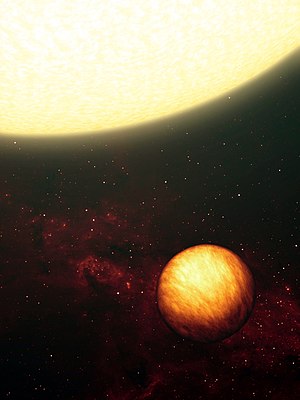Upsilon Andromedae b
| Exoplanet | List of exoplanets | |
|---|---|---|
 |
||
| Parent star | ||
| Star | Upsilon Andromedae A | |
| Constellation | Andromeda | |
| Right ascension | (α) | 01h 36m 47.8s |
| Declination | (δ) | +41° 24′ 20″ |
| Apparent magnitude | (mV) | 4.09 |
| Distance | 44.0 ± 0.1 ly (13.49 ± 0.03 pc) |
|
| Spectral type | F8V | |
| Mass | (m) | 1.27 (± 0.12) M☉ |
| Radius | (r) | 1.480 (± 0.087) R☉ |
| Temperature | (T) | 6213 (± 44) K |
| Metallicity | [Fe/H] | 0.09 (± 0.06) |
| Age | 3.12 (± 0.2) Gyr | |
| Orbital elements | ||
| Semi-major axis | (a) | 0.0595 ± 0.0034 AU (~8.91 Gm) |
| ~4.41 mas | ||
| Periastron | (q) | 0.0549 ± 0.0046 AU (~8.22 Gm) |
| Apastron | (Q) | 0.0609 ± 0.0046 AU (~9.11 Gm) |
| Eccentricity | (e) | 0.022±0.007 |
| Orbital period | (P) | 4.62±0.23d (0.01328 y) |
| (~116.4 h) | ||
| Inclination | (i) | ~25° |
| Argument of periastron |
(ω) | 63.4° |
| Time of periastron | (T0) | 2,451,802.64 ± 0.71 JD |
| Semi-amplitude | (K) | 69.8 ± 1.5 m/s |
| Physical characteristics | ||
| Minimum mass | (m sin i) | 0.62 ± 0.09MJ |
| Discovery information | ||
| Discovery date | June 23, 1996 | |
| Discoverer(s) | Marcy et al. | |
| Discovery method | Radial velocity | |
| Other detection methods | Reflection/emission modulations | |
| Discovery site |
California and Carnegie Planet Search |
|
| Discovery status | Published | |
| Other designations | ||
|
Saffar, 50 Andromedae b, Upsilon Andromedae Ab
|
||
| Database references | ||
| Extrasolar Planets Encyclopaedia |
data | |
| SIMBAD | data | |
| Exoplanet Archive | data | |
| Open Exoplanet Catalogue | data | |
Upsilon Andromedae b (υ Andromedae b, abbreviated Upsilon And b, υ And b), also named Saffar, is an extrasolar planet approximately 44 light-years away from the Sun in the constellation of Andromeda. The planet orbits the solar analog star, Upsilon Andromedae A, approximately every five days. Discovered in June 1996 by Geoffrey Marcy and R. Paul Butler, it was one of the first hot Jupiters to be discovered. It is also one of the first non-resolved planets to be detected directly. Upsilon Andromedae b is the innermost known planet in its planetary system.
In July 2014 the International Astronomical Union launched a process for giving proper names to certain exoplanets and their host stars. The process involved public nomination and voting for the new names. In December 2015, the IAU announced the winning name was Saffar for this planet. The winning name was submitted by the Vega Astronomy Club of Morocco and honours the 11th Century astronomer Ibn al-Saffar of Muslim Spain.
Like the majority of known extrasolar planets, Upsilon Andromedae b was detected by the variations in its star's radial velocity caused by the planet's gravity. The variations were detected by making sensitive measurements of the Doppler shift of Upsilon Andromedae's spectrum. The planet's existence was announced in January 1997, together with 55 Cancri b and the planet orbiting Tau Boötis.
...
Wikipedia
